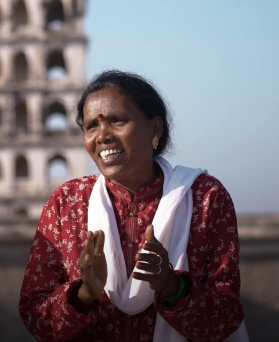Folk Arts Grant
About
The Serendipity Arts Folk Arts Grant offers financial support to practitioners in the field of folk traditions in the performing arts for a period of six months. The goal of the grant is to facilitate the enhancement of the artist’s practice through further pursuance of their discipline and in turn contribute to the community and the tradition. The awardee will be chosen from a pool of candidates nominated by the Jury.
INTAKE
1 Artist
GRANT AMOUNT
1,00,000/- Each grantee
This is a nomination based Grant.
JURY

Paul Jacob is a pioneering Indian musician dedicated to empowering folk artists nationwide. Starting as a bass guitarist at 12, he played with various bands, including “Nemesis Avenue” featuring Oscar-winner A.R. Rahman. Paul studied Carnatic music under Grammy-winner Vikku Vinayakram while composing for advertising.
He founded Bodhi muzzik to promote traditional Indian music, producing collaborations with international artists and touring globally. Paul has composed for films, theater, and documentaries.
His vision to empower folk music drives initiatives like “The Laya Project,” “The Sufi Route,” and “Chennai Sangamam,” featuring over 2,500 artists. Paul mentors successful artists and projects, including “Casteless Collective,” while continually exploring collaborations to showcase Indian traditional music internationally.

Preethi Athreya trained in classical Indian dance and went on to do a Master’s degree in Dance Studies at the Laban Centre, London. She chose to continue her journey in her native Chennai, with a strong commitment to constantly redefine the Indian body. Working within the Indian contemporary dance scene as a performer, choreographer and facilitator, Preethi has been engaged in creating a personal movement language that reflects her relationship with her context, being at the same time open to new ways in how we may relate to the body. Preethi Athreya has created and co-produced thirteen original works of her own from 2006 to 2023, key among them being The Jumping Project (2015), The Lost Wax Project (2018), BIRD (2021) and INHERITAGE (2023). She has been a resident choreographer at the Cite des Arts, Paris/ CND in 2022, as well as a recipient of the Camargo Foundation’s fellowship in 2021 in Cassis, France. She received the Asia Pacific Performance Exchange (APPEX) residency in Bali in 2010 as well as the Charles Wallace Fellowship in London. In India, she was awarded the Bismillah Khan award for her choreographic contribution by the Ministry of Culture, India. Her work has been featured in forums such as the Szene Salzburg, the 8 Tension series at Impulstanz Vienna, the South Bank Centre London and the Esplanade theatre in Singapore, among others. Notable in her approach is the configuration of performance space and interaction in new and challenging ways.
Preethi is the founder of CHARCOAL – a platform for artistic collaboration as well as one of the co-founders of Basement 21, a practice-based performance collective in Chennai.

Sharanya Ramprakash is a Bengaluru based theatre maker. She places her work in the intersection of gender, tradition and language. She writes, acts, directs and collaborates with a range of forms, communities and theatre makers across local, national and international locations. Her work is research based, collaborative and exploratory. She is an INLAKS scholar and Member of the Lincoln Center Director’s Lab, New York. She is the recipient of the Shankar Nag Theatre Award 2022.
GRANTEE

S. Rani is a Folk singer and community leader who comes from a Dravidian Ethnic group categorised as a Scheduled Tribe (ST) called the Irulars. The Irulars are a community who were originally snake catchers and rat catchers whose livelihood was affected by the ban on the snake skin trade, furthermore, the introduction of pesticides had taken away their source of income from farmers for catching the rats. She is powerful singer and a social worker with an experience of 25 years working with NGOs and also the leader of a women’s cooperative society running for 15 years.
As an Irular, Rani’s music stems directly from powerful social elements like stories of their land, their people and their limited resources. Irular songs are literal oral treasures that have been passed on through the community for centuries and Rani is a vessel that is currently carrying the stories of their land and has been attempting to sing it on larger stages outside of their communities.
Rani has also initiated a festival at Mahabalipuram that brings together the entire Irular community (around 100,000 people) from all across Tamil Nadu helping them address issues of slavery, bonded labour and education. She recently performed at a folk music showcase by the Tamil Nadu state government called the Chennai Sangamam where she performed for the first time in front of a 5000+ audience from different communities.


